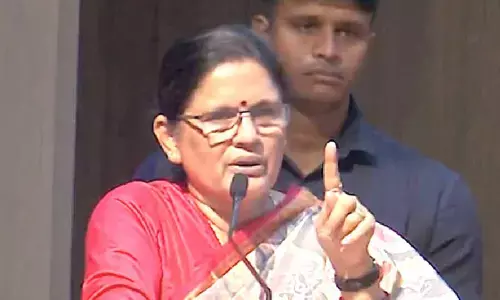Chinese get it wrong

Like Benedick and Beatrice, of Shakespeare, who are tricked into confessing their love for each other or the rejection of the Hero by Claudio, it sounds so funny that human nature has not changed much in the past four hundred and more years or so.
Like Benedick and Beatrice, of Shakespeare, who are tricked into confessing their love for each other or the rejection of the Hero by Claudio, it sounds so funny that human nature has not changed much in the past four hundred and more years or so.
Look at the episode of our Defence Minister Nirmala Sitharaman's simple gesture of greeting the Chinese soldiers at Nathu La the other day. Reports stated that she said 'Namaste' to those soldiers and sought to know how would the Chinese greet people in turn in Mandarin.
The netizens went bonkers over it and interpreted it variously. Chinese hailed it as a right step towards resolving border disputes. Such is the frailty of human nature that it looks for symbols instead of a purpose. Should it rake a discussion or debate, a gesture alone, it should lead to a concrete proposition.
Look at what the Chinese proposed after they welcomed the 'Namaste' in their editorials and in their media analyses. For us, Indians, it was more of a courtesy. We greet everyone with a namaste. Moreover, this is a peace time, at least an interregnum between two clashes that demands extension of certain courtesies. Our mythology illustrates how the heroes like Arjuna sent 'Namaskara Baanaas" to the elders before taking them on in wars even.
But, the Chinese continued their interpretation further stating the gesture was more of an extension of her hope to have peace with China. This for them was a manifestation of Indian mind-set and the editorial in Global Times added, "confrontation with Beijing is also a radical idea beyond its national strength and contradicts its fundamental interests. Such an idea is only advocated by extreme nationalists." Every Indian hopes for peace everywhere, but not at the cost of his land.
Hence, the Chinese advice to us to shed ambiguity and chaos in understanding the Sino-British Treaty of 1890 is laughable. It has been rejected by us long back and there is no ambiguity to it.
The Chinese would never change and as our Army Chief had rightly put it, they prefer 'Salami slicing.’ Strangely, it continues to offer us an unsolicited advice on how we should conduct with other countries too.
China knows that the Himalayas offer no playground to it. Any misadventure here would only backfire on it. Unlike its media that blares about its strength and keeps warning us of consequences every day, its Western Theatre Command knows how complex the terrain is, including the deserts and high mountains.
Could it really afford a confrontation with India while the unrest in Tibet continues to simmer and its own Xinjiang province keeps burning? It is not strange that it attempted to read too much into a simple greeting of the Indian Defence Minister. After all, it is a nation that is afraid of symbols and had banned even names and prayer mats of a religion. Contrivance, they name is China!
As for Sitharaman's 'Namaste,' it just proves the Indians' belief in the dictum – no matter what someone else has done, it still matters how we treat people.







